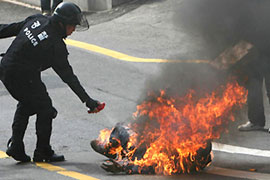Korea free trade deal agreed
Controversial agreement with US reached after months of negotiations and protests.

Published On 2 Apr 2007
Most of the protests have been over fears that South Korea’s heavily-subsidised farmers would not be able to survive a flood of cheaper US farm products.
The United States has been demanding that South Korea – whose consumers pay some of the world’s highest prices for their food – opens its tightly protected farm market to American beef imports.
South Korean farmers say opening the market would cost them billions of dollars and tens of thousands of jobs.
The agreement came after a marathon eight-day round of talks in Seoul, with negotiators sometimes working through the night to fine-tune the details.
Fast track
 |
| One anti-FTA protester set himself on fire on Sunday [GALLO/GETTY] |
The negotiators were under pressure because George Bush, the US president, must notify Congress that he plans to sign a trade agreement 90 days before his special Trade Promotion Authority expires July 1, meaning the agreement had to be concluded by the beginning of April.
That so-called ‘fast track’ authority allows Congress to ratify or reject, but not modify, trade deals negotiated by the White House.
The deal will still need legislative approval in both countries before it comes into effect.
Both governments have been strong advocates of a deal, saying it would boost trade and economic growth in two of the world’s largest economies.
Some estimates say an agreement could add $20 bn to the already more than $70 bn of two-way trade each year.
However, as well as disputes over agriculture, disagreements over trade in automobiles, textiles and other issues, including the status of South Korean goods manufactured in North Korea, had held up reaching a deal.
Source: News Agencies